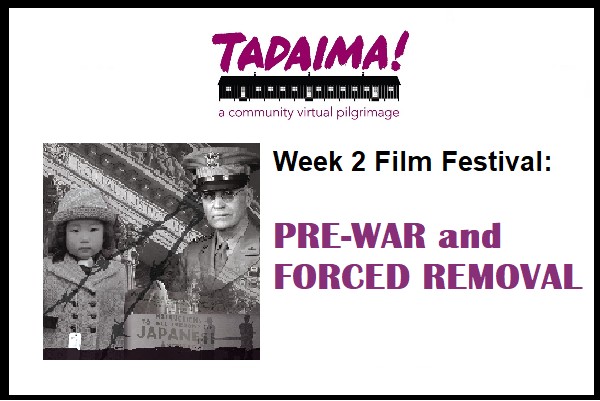FILMS WILL BE RELEASED ON JUNE 21, 2020
Visit: https://www.jampilgrimages.com/film-festival

ALTERNATIVE FACTS: THE LIES OF EXECUTIVE ORDER 9066
Directed by Jon Osaki
ALTERNATIVE FACTS sheds light on the people and politics that influenced the signing of the infamous Executive Order 9066, which authorized the mass incarceration of nearly 120,000 Japanese Americans. The film exposes the lies used to justify the decision and the cover-up that went all the way to the United States Supreme Court. ALTERNATIVE FACTS will also examine the parallels to the current climate of fear, targeting of immigrant communities, and similar attempts to abuse the powers of the government.

BAINBRIDGE ISLAND: BEARING THE UNBEARABLE
Bearing the Unbearable tells the story of the forced removal of Japanese Americans from their home on Bainbridge Island during World War II and their subsequent incarceration in Manzanar and Minidoka concentration camps, innocent of any crime and suspect only because of their ethnicity. Told in the words of Bainbridge Islanders who survived the camps, the film explores the experience of incarceration and the unconstitutional suspension of these islanders’ civil rights. The film profiles the resilience of camp survivors, and the island journalists who were a lonely voice against the incarceration. Bearing the Unbearable highlights the determination of the camp survivors to share their story as a cautionary lesson for America today.

HOLLYWOOD AT WAR: ANTI-JAPANESE PROPAGANDA IN WWII
During the Second World War, the United States government enlisted the help of Hollywood filmmakers to carry out their propaganda messages on the big screen. The following excerpts were gathered from the vast body of anti-Japanese propaganda newsreels, cartoons, and scripted films produced by Hollywood studios under the guidance of the Office of War Information. All of these films are believed to be within public domain. This video was compiled for educational purposes pursuant to fair use guidelines. Edited by Rob Buscher – all rights belong to original Copyright holders.

THE ORANGE STORY
Directed by Erika Street
The Orange Story is a narrative short film that tells the story of an elderly Japanese American man who must sell all his belongings and report to a temporary detention center during WWII from where he will be forcibly removed to an undisclosed location. The film also uses archival radio, film, and photographic sources to complement this narrative, providing a strong historical context for the story.

THE EMPTY CHAIR
Directed by Greg Chaney
The Empty Chair is a unique documentary about how Japanese Americans from Juneau, Alaska were sent to prison camps during WWII and how the small Alaskan community stood in quiet defiance against the immoral internment of American citizens. Japanese immigrants came to Alaska in the early 1900’s and settled here to raise families. Japanese Americans from the west coast of the US including Alaska were sent to prison camps by the US government from 1942-1945 because all people of Japanese heritage were considered national security risks. John Tanaka was born and raised in Juneau. In 1942 John was going to be the Valedictorian of his high school graduating class but was scheduled to be interned before the graduation ceremony. In response, the school board voted to hold a special early graduation ceremony for him before John was sent to a relocation camp for Japanese Americans. When the official graduation ceremony was held for the class of ’42 they set aside an empty chair on the platform.

